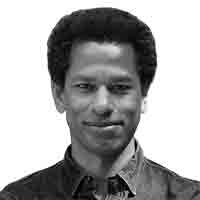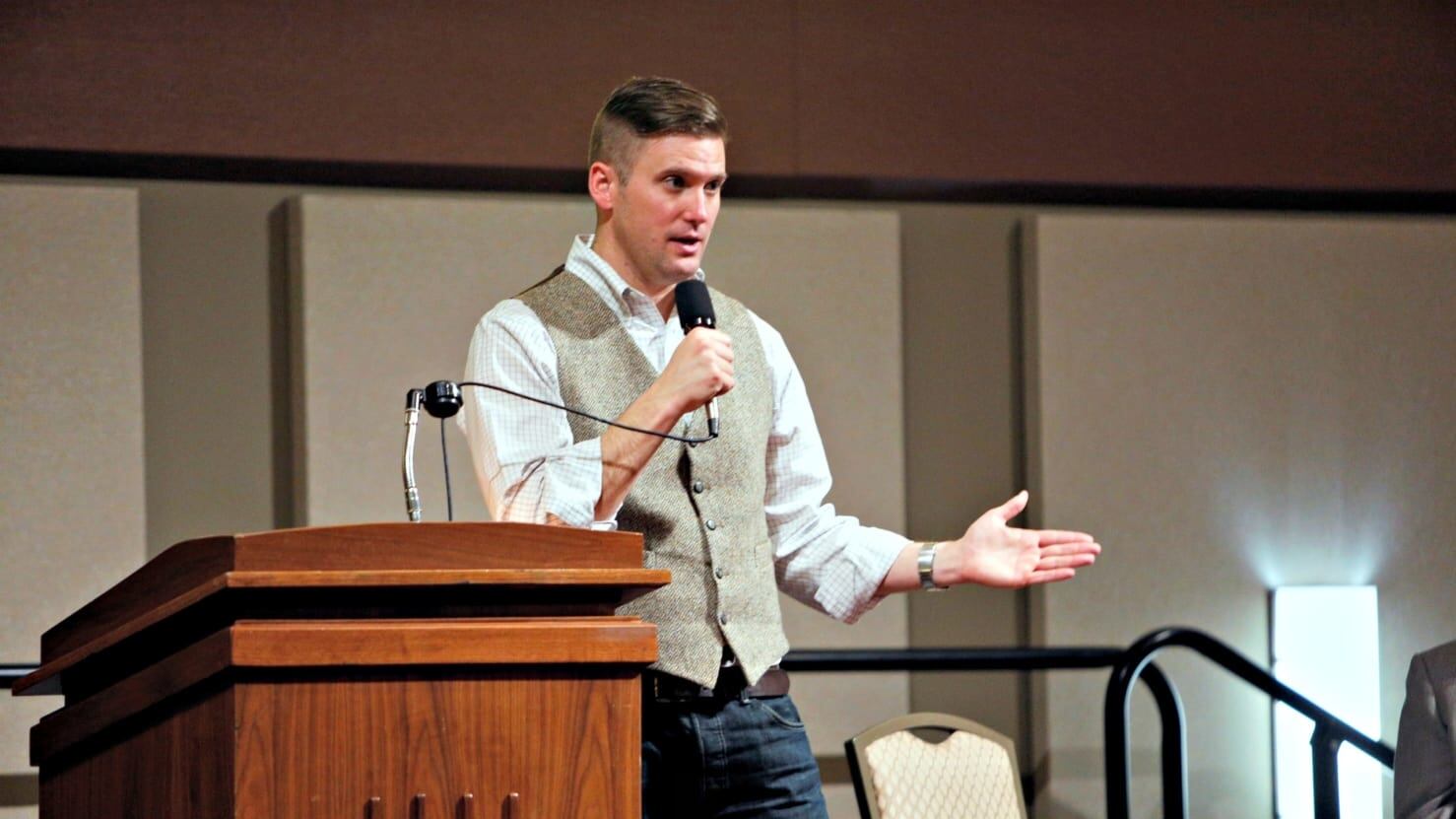A note to my Black and brown friends in media: for the love of God, stop interviewing Richard Spencer. He’s a professional racist and white supremacist Nazi-sympathizer who leads the alt-right.
Why are we interviewing him? Because he’s the most famous openly racist person in America? Because he’s also calm, polite, relatively articulate, and willing to show up for almost any interview? I think that if you have principles behind your presence in media—if you’re in media for a purpose beyond getting a check—then you should not interview Richard Spencer.
To be clear, I’m not talking about reporters who check in with him for a comment after he gets punched in the face on the street or gets yelled at in the gym by a female professor and ends up having his gym membership revoked. Reporters doing those sorts of stories have to give Spencer the right to comment on stories that involve him. I understand the newsy angle of stories with the subtext “professional racist continues to struggle to live in modern society.”
I’m also not talking about reporters who covered the rally Spencer led in DC after election day—the event where they traded Nazi salutes. That’s when his rise was still news. Those stories did valuable work of alerting many to what the alt-right was really about and how audacious they had become. Those reporters were sounding an alarm about the rise of a dangerous hate group that Americans needed to know about.
But since election day, there have been several instances where Black media figures interview Spencer in the guise of searching for a deeper understanding of the psychology and personality of the professional racist. My man W. Kamau Bell at CNN, Roland Martin at TV One, and Charles Barkley of TNT have all done in-depth interviews exploring the surface of Spencer's views. (I say surface because Spencer never gets deep.)
Recently, Graeme Wood, an Asian-American writer and political science professor at Yale who happened to know Spencer as a teenager when they attended the same high school, published a long story in the Atlantic and Spencer. It was thoughtful and well-written and gave far too much attention to someone who has not earned it.
I issue the same plea to journalists who are white—stop the deep personality profile sort of interviewing of Spencer—but when a Black or brown or Asian journalist talks to him, there’s a deeper game going on. This didn’t start with Spencer, of course. The “Black journalist interviews the committed racist” trope has been going on for decades—Oprah had skinheads on her show in the 80s.
It seems like some see this exercise as the ultimate test of a Black or brown journalist’s professionalism—can you remain calm while interviewing someone who hates you personally? Can the Black journalist put journalism ahead of identity, and let a Klansman, skinhead, Nazi, or alt-righty make their cockamamie points? Or are you Black first, meaning you can’t compartmentalize enough to do your job when you are personally threatened by the interviewee?
That test is bullshit. Are white media figure ever exposed to any similar test? Do they ever have to prove that they’re journalists before they’re white? Never.
More than that, Black journalists in this situation are being used. The optics of the Black journalist interviewing the professional racist are part of the whole scenario. Media organizations like having Black journalist conduct these interviews because it insulates them from the critique of giving voice to a racist. If a Black person is conducting the interview then it’s not a racist exercise, right?
The professional racist likes being interviewed by a Black journalist because it makes them seem less racist because look, there he is calmly talking to a Black reporter. They’re both laughing and drinking tea while talking about white superiority. If Spencer can have a reasonable chat with a Black person then he can’t be that bad, right?
By interviewing him, what you’ve done is help normalize and mainstream a dangerous person who’s open about his desire to perpetuate white supremacy and who’s an inspiration to people who want to see us deported, segregated, or dead.
Spencer has said (I’m quoting him as little as possible on purpose) that if the alt-right triumphs (whatever that means) then “we’re going to throw [people] in jail.” This is not a simple identity movement. This is not about interviewing people with views that are different than ours. This is about giving voice to violent hatred, to someone who is inspiring hate crimes, to someone who aspires to something he calls, “peaceful ethnic cleansing,” (whatever that means).
It may easy for some white editors/producers—and readers—to dismiss Spencer as “merely repulsive” or an “interesting figure from this era” rather than “actually dangerous.” Don’t make that mistake just because his rhetorical gun isn’t pointed at you. I am far more likely to be killed by a violent white supremacist who’s American than by someone from ISIS.
Every moment spent not covering Spencer and his followers as if they were a clear and present danger is a victory for them. So what are you doing with your career when part of it involves helping America’s most famous professional racist get a little more famous and a little more normalized?
I’ve always thought that we should interview people because either they’re (1) a newsmaker (an elected official, an author, a guy who jumped into the river to save the baby, i.e. a person who’s driving the story), or (2) a valuable analyst (usually a writer or an academic or an experienced practitioner who’s an expert in the area under discussion), or (3) they’re an eyewitness to an important moment (“I saw him jump! It was horrifying!”), or (4) they’re entertaining (which I mean in the best possible sense, as in, someone who’s going to captivate the audience).
Where does Spencer fit in?
He’s obviously not an analyst or an eyewitness. Is he a newsmaker? I understand the argument that he is as the head of the alt-right but I would argue no. He’s not actually driving news—the alt-right is a small, unimportant American institution with none of the power to shape the national conversation that the Tea Party or the Klan once had.
When have Spencer’s words or actions actually driven the news? Not once since the big post election meeting in DC that made him so well-known. In terms of news, he’s far less likely to say or do something that is newsy in and of itself and far more likely to be the victim: Spencer gets cold-cocked, Spencer gets turned away from CPAC, etc.
But TV is about entertainment, even the news. The hosts, the guests, the stories, all must be so compelling that you feel you have to watch. If Spencer were entertaining then I would understand the piling on of interviewers but he’s so not.
Milo Yiannopoulos is entertaining. Rush Limbaugh is entertaining. Ann Coulter, to some people, is entertaining. They’re nuts, I disagree with every idea they espouse, but I can’t deny that they’re skilled media performers. The way they express themselves is compelling. Spencer is boring. I can’t tell if this is by design—as if his calm and politeness are supposed to be proof that he’s not a dangerous racist but just a racist—or if he’s just a boring person.
I watched several of his public moments before writing this and I suspect he’s just a boring person. Spencer aspires to be America’s supertroll but he’s not smart or personable enough to be good TV. He’s just a malignant cancer who’s trying to clean up racism and make it acceptable in polite society by pretending its an identity movement. He needs media to get there. Why the hell are you giving him a platform?
For Spencer to be worthy of multiple long interviews about his views, I’d expect the audience to be learning something from these chats. But nothing is learned from listening to him over and again. He’s a garden-variety racist with old, hoary views. He thinks Blacks have lower IQs and are genetically predisposed to crime. So intriguing. Germs and viruses evolve in response to medicines and vaccines but racism doesn’t evolve in response to progress. Fascinating. Spencer may have changed the way people expect racists to look—once they wore hoods, now they dress like baristas—but he has not advanced how they think.
He doesn’t have new ideas nor does he express himself in an interesting, telegenic way. He’s neither witty nor funny and his personality is as stale as an old cracker. He doesn’t even come across as intelligent. Earlier I said Spencer is “relatively articulate” because yes, he’s articulate as far as racists go—he doesn’t sound like he’s part of the Duck Dynasty clan—but why would he be judged by that standard?
He has a masters from the University of Chicago and was a doctoral student at Duke, which he did not finish. As far as academics and intellectuals go, he’s very far from articulate. He does not talk like someone who’s attended several universities. Any critical race theory studying sophomore could humiliate him in a serious discourse. We would dismiss an old racist in overalls with two teeth left in his head, so why would we take seriously the young racist in a three piece suit who’s saying the same exact crap?
For many people in media the argument would come down to eyeballs. If you interview Richard Spencer people will watch so that alone justifies talking to him, end of story. They might say this article alone proves the point—you wrote about my Spencer piece and if it got attention then it was worth it. I doubt Spencer is getting ratings that justify the breadth of coverage of him but putting Nielsen numbers aside, we have to ask ourselves why we are in media?
Black people should not be in media primarily to help Black people, that cannot be a core goal—you have to be a journalist first. You have to pursue the facts and the truth. We cannot be journalists who are Black first and journalists second. But we also cannot allow ourselves to be pawns in a game that hurts Black people.
When Black journalists participate in normalizing the fringe views of racists because they dressed up nicely we are giving respect, attention and power to people who do not hold views worthy of public discussion. And we are helping people who would like to see us dead.






